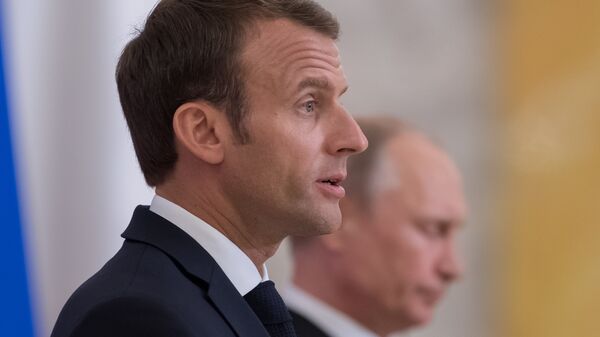Sputnik: President Macron has stated that France recognizes Russia's new role in international relations. How significant is this statement?
Gino Raymond: I think it's a recognition of the reality; only couple of weeks ago, Macron went to the United States, and there was this very cordial, even warm embrace with Donald Trump. And I think, like most European leaders, they are actually flattered to go the White House. They are rather seduced by the glamour of American politics. But the reality is, as Macron has discovered, that the US always protects America's interests, and I'm coming back to Europe where a number of things have happened that have underlined the fact that whatever the US says to its European allies, it has its own agenda. It will protect its own interests. France realizes that Russia is a neighbor. It's a neighbor that Europe and France have to engage with in order to look for common solutions to common challenges.
Sputnik: How would you characterize the relationship between Putin and Macron?
Gino Raymond: I think it's interesting. Both of them attach a great deal of importance to the image they have; the image of strength, the image of vigor, the image of dynamism and decisiveness. And I think the impression they hive is of two individuals that can talk to each other. Now when Macron came to power, when he was elected to the presidency, he did actually say that France would talk frankly to everybody, and I think he is quite proud of the fact he is no afraid of engaging on difficult issues. But he also said that France's position would be to look for pragmatic solutions. So, the impression one has is that Macron is able and willing to do business and to look for solutions with Putin and with other international partners.
Sputnik: What do you think the future of the [Iran] nuclear deal is? Do you think that President Macron and Putin will be able to find the common ground and work toward keeping that deal alive?
Gino Raymond: Well, there is already a common ground in that Russia and the European partners that signed this deal — Britain, France and Germany — they clearly feel that this deal has to stay on the table, it has to survive. So that already sets them in one camp together, in opposition to the United States. Now, within that camp, which includes Russia and its chief European partners, there are divisions, there are differences of opinion.
READ MORE: France Wants to Become Leader in Foreign Investment in Russia — Macron
France, for example, believes that the deal that arrived in 2015 needs to be expanded. Russia disagrees with this. France thinks that it should cover other areas of Iranian activity in Syria and elsewhere. So, there is possibly leeway there on the one hand, Macron saying to the United States "maybe we could take the deal forward and possibly, if you allow us, we will negotiate with Russia, with Putin to see if we going to actually adjust this deal." But to be honest with you, the outlook is pessimistic. Given Donald Trump's attitude and particularly the way he can behave in a very, frankly, undiplomatic way, or can change his mind, or can act in a very impulsive way, it makes it difficult to see a way forward on this very difficult issue.
The views and opinions expressed in this article are those of the speaker and do not necessarily reflect those of Sputnik.

